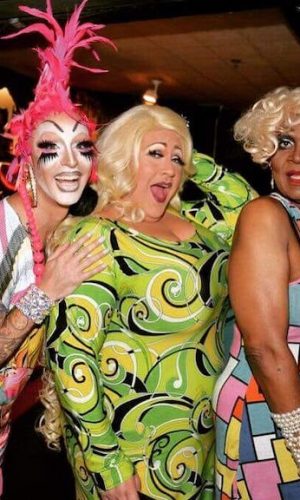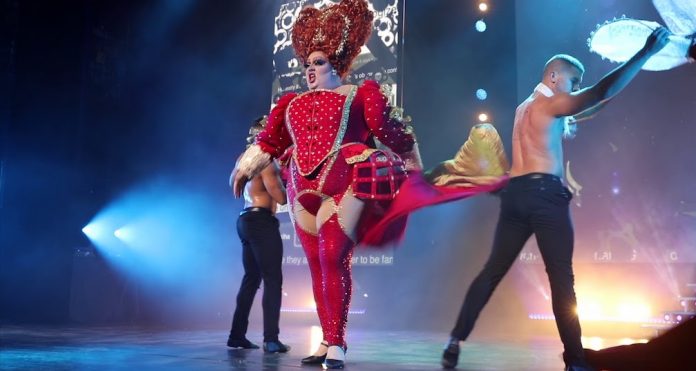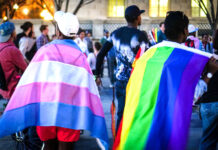[This article appears in the September/October 2019 issue of Boston Spirit magazine. Subscribe for free today.]
It’s good to be king. It’s even better to be a drag queen.
Well, that’s true for a certain segment of the royal family, anyway. Thanks in large part to the success of “RuPaul’s Drag Race,” the Emmy-winning VH1 reality show that brought drag out of dive-y gay bars and on to the big-budget stage of mainstream Hollywood, some queens have become bona fide celebrities. And they earn like it, filling their international tour calendars with gigs that score them thousands of dollars per appearance. We haven’t even talked about all the merchandising, music albums and other opportunities that come their way—whether or not they even won RuPaul’s crown. (Being a big, memorable TV personality pays just as well.)
And yet, even as some performers are reaping the benefits of drag’s unprecedented new level of success, others are—to lift a queen catchphrase—being paid dust. These are the quote-unquote “local queens,” the gals tucking and toiling hard in the neighborhood bars and clubs in cities across America, including in New England, plying their gender-screwing craft not to net the most Instagram followers, but to be part of a long heritage of gay and queer culture. They are among our community’s most vital activists and brightest entertainers.
They need to eat too. But “Drag Race” has complicated things. On one hand, that it’s popularized drag has, in some circumstances, resulted in more gigs. On the other, local queens are still working for mere shillings, and audiences are saving their tips to see the TV stars. Not to mention that drag, historically a proudly subversive tool of the counterculture, is starting—like everything else—to benefit the already-privileged. Because now that it’s a road to fame and fortune for the lucky few, queens with cash flow speculatively invest, and mightily so, in designer costumes and social media followings in order to land a spot on the show. They are true pageant girls, purchasing their best chance for a ticket to the top. Meanwhile, those with less access to means, including those who paved the way years ago, are still sewing their own outfits and receiving little gratitude.
“The difference in pay is astronomical, and so is the difference in support,” says Kiki Lucia.
Pay gap
Like lots of other queens in New England, Kiki spends a lot of money to build her wardrobe, and works long hours to produce, promote and perform in her shows—like “Let’s Have a Kiki,” her monthly event at Partners Café, a New Haven gay bar. Patrick Dunn, as Kiki is known once the lashes come off, also works a full-time job as the first-ever executive director of the New Haven Pride Center in Connecticut.
“Most of the ‘RuPaul’ girls are very talented,” says Kiki. “But they can stand still on a stage and get hundreds of dollars, then a local comes out, does sideways splits and jumps and a crazy performance—and gets, like, ten dollars.”
“It all comes back to how audiences consume drag. There can be this expectation that drag is ‘RuPaul’s Drag Race,’ so ‘until you get on there, I don’t care about you!’”
Kiki makes about $100, plus tips, from a typical bar show. (For which, she’s probably wearing several-thousand-dollars’ worth of costumes.) Compare that to the $7,000 quote that Dunn recently received from an early-season “Drag Race” contestant, while researching entertainment for Pride New Haven.
And that was a bargain, according to some promoters I spoke to. Depending on their level of popularity (or notoriety, for that matter), “Drag Race” girls can earn up to $10,000 to perform one number and stick around for a meet-and-greet.
It’s not just the clubs where local queens are feeling the squeeze. There are murmurs that Provincetown’s summer seasons have gotten more challenging since the “Drag Race” stars started moving in for runs. Audiences are also saving their money for high-priced, national theater tours that group fan-favorite queens together—like the “Werq the World Tour,” which brings “Drag Race” stars to Boston’s Wang Theatre and Connecticut’s Foxwoods Casino in October.

Friendly competition
Even if it sometimes smarts, local queens don’t begrudge the “Drag Race” stars for taking what they can get. And they’re especially proud when their own hometown girls hit the big-time.
Just ask Kris Knievil, a buxom, blonde, and highly beloved fixture on Boston’s drag scene since the late-’90s and the program director at Boston’s storied drag bar, Jacques Cabaret. “Miss Kris” also works a day job a Dorothy’s Boutique, a wig- and fishnet-filled shop favored by performers. It’s the same store where Brian McCook, now better known as “Drag Race” standout Katya, once punched a timecard.
Katya’s not stocking shelves anymore. Her national tour just swung through Boston, playing the thousand-seat Wilbur Theatre. Other notable, New England-bred “Drag Race” vets include Boston’s Jujubee, star of the TLC network’s new bridal show “Drag Me Down the Aisle”; New Hampshire native Laila McQueen, recently featured in a makeup-tutorial video on Cosmopolitan.com; and Violencia Exclamation Point, a punky Boston queen, is currently competing on “The Boulet Brothers Dragula,” a “monster drag” competition that is an edgier, horror genre-spiked spin on “Drag Race.” The formerly web-based series was snatched up by Amazon Prime Video for its new third season.
Kris is happy for the success of her local sisters; in fact, she’s auditioned for “Drag Race” multiple times herself, and seemingly made it close to the final cut. And at Jacques, she’s a judge for the third cycle of “Drag Gauntlet,” a popular, weekly live series that applies the “RuPaul’s Drag Race” elimination model to fame-seeking local queens.
That said, she’s noticed a few side effects of the “Drag Race” phenomenon—like, say, some homogeneity among queens who are all basing their makeup and looks on whatever’s trendy on TV.
“At a certain point, people really start to blend together,” Kris says.
That might be because, to some extent, queens craving camera-ready ensembles are now outsourcing some of their design work—acting more like curators of other folks’ craft.
Cottage industry
Which brings us to another change in the biz: though local queens aren’t necessarily taking home more money in the post-“Drag Race” era, other artists are able to realize their dreams in new ways. Recent years have seen the development of a cottage industry around catering to queens. Fashion designers, makeup artists, and makers of wigs, jewelry, and other accessories are building businesses by selling to famous—or fame-seeking—drag performers who used to do it all on their own.
Take Will Doughty. Two years ago, the Connecticut-based stylist started selling his personally styled wigs through his Internet store, Shop Will Beauty. He started off making about $2,000 per month in sales; now he averages about $10,000. It’s become his full-time job, and allows him to earn a far better living than he ever could have performing as Bridgett London, his former drag alter ego.
“A few years ago, I never could have made a living selling wigs out of my house,” says Doughty. “But now that ‘Drag Race’ airs about six months of the year, it’s catapulted drag into the mainstream.” He estimates that about half his orders are from customers under age 20, who want to be queens, and notices that he sells more of whatever look current-season standouts are rocking. Everyone wants to be a star.
New venues
The good news is, they are starting to get more platforms at the local level. The popularity of “Drag Race,” which reaches a much wider audience than just gay bar regulars, has created an uptick in private and corporate events, say queens like Kris Knievil. Promoters are planning unique experiences, like “Local Drag at Sea” a Boston-to-Bermuda cruise being organized by Henry Paquin Presents for August 14–21, 2020.
Drag performances are being booked by major venues that never previously showed interest—like Boston’s Museum of Science, for instance, which has been hosting shows in its planetarium. And straight bars and restaurants are seeing dollar signs in drag brunches and dinner shows: In Boston alone, the 1795-founded Bell in Hand Tavern, America’s oldest continuously operating tavern; Lansdowne Pub, across the street from Fenway Park; and Carrie Nation, a swanky after-work favorite for State House suits, are among the unlikely new destinations banking on drag to bring in new guests.
The bets are paying off. In fact, the weekly Sunday brunches at Carrie Nation, now in their third year, have been such a success, the queens were recently able to negotiate even better terms for themselves, according to performer Destiny Phon, who cohosts and produces the show.
As for the gay bars and nightclubs? Funny enough, as the “Drag Race” queens ascend to ever higher levels of fame, they may wind up ceding the nightclub scene to the locals once again.
After all, the clubs soon won’t be able to pay them, says Rafael Sanchez, whose Rafael Sanchez Presents/Gay Mafia Boston produces some of the largest LGBTQ events in New England. Sanchez says that the booking fees for “Drag Race” queens is, “a bubble that’s always expanding—and bound to burst eventually.”
“Soon the clubs won’t be able to pay them,” says Sanchez, who co-owns EGO Providence, Rhode Island’s biggest gay dance club.
Don’t get him wrong, he loves drag, and what it does for business. But even though Sanchez does sometimes still book national names for his club nights, he’s found that it makes more sense to graduate the “Drag Race” girls to theater tours, which can sell pricier tickets to a whole new market (including suburban reality-TV fans) that might not make it to a gay bar. Sanchez produces recurring “Dragathon” tours that’ll next bring nationally known queens to New England around Halloween.
The TV stars are the ones who move the big tickets, says Sanchez: “When I started in this business, it was all about the superstar-DJs of the moment. Now it’s the drag queens.”
But Sanchez has made a point to feature—and compensate—local girls at these shows, giving them the opportunity to open for the major names. It’s important, he says.
“There’s so much talent out there,” he says. “Go to any city in America with great nightlife, and you’ll find queens who put in the same effort, if not more, on stage.”
Not a subscriber? Sign up today for a free subscription to Boston Spirit magazine, New England’s premier LGBT magazine. We will send you a copy of Boston Spirit 6 times per year and we never sell/rent our subscriber information. Click HERE to sign up!









